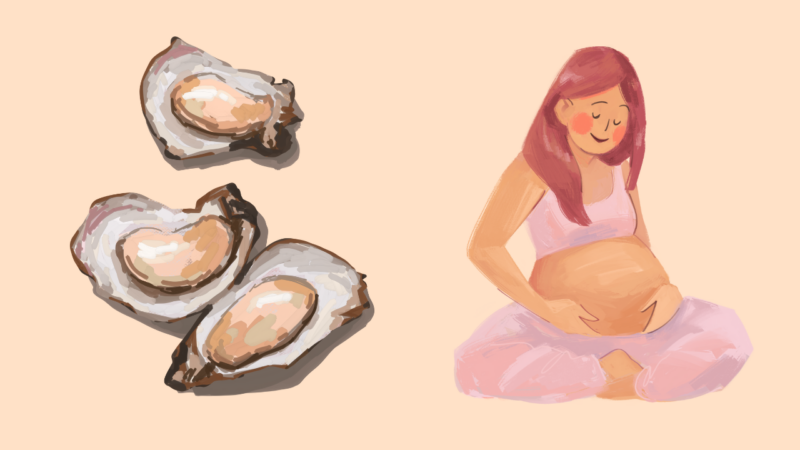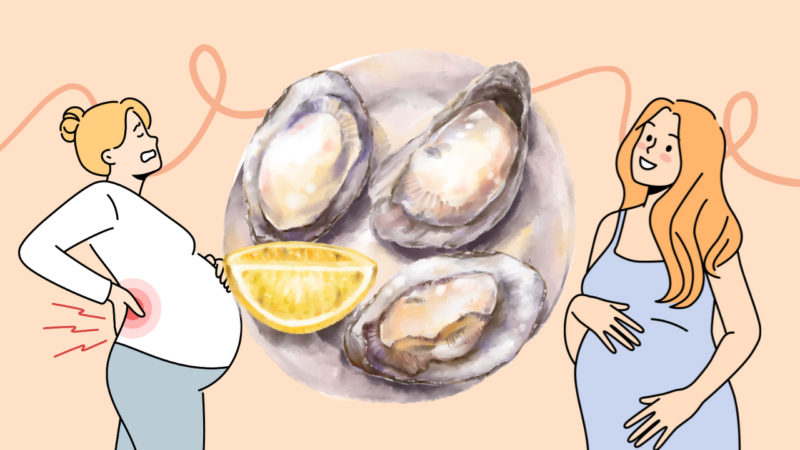The good news is that oysters can be safe to eat during pregnancy, but only if they are thoroughly cooked. Why is cooking so important? When oysters are raw or undercooked, they can carry harmful bacteria and viruses, making them dangerous for pregnant women. But if oysters are cooked properly, they can be a nutritious addition to your diet.
During pregnancy, your immune system undergoes changes, making you more susceptible to foodborne illnesses. In particular, raw or undercooked oysters can carry Listeria and Vibrio vulnificus, both of which are harmful bacteria that can cause severe health problems.
For this reason, health professionals recommend that pregnant women avoid raw oysters entirely. Cooked oysters, however, are generally safe to eat as long as they reach the right temperature to kill off any harmful bacteria. The cooking process turns the oysters’ texture firm and ensures that it is safe for you and your baby.
The Risks of Eating Raw Oysters
You may be asking, “What’s the big deal with raw oysters?” After all, many people enjoy them without issue. But for pregnant women, raw or undercooked oysters can pose significant health risks. Let’s break down the major concerns:
1. Listeria
Listeria is a type of bacteria that can contaminate raw seafood, including oysters. It causes listeriosis, a serious infection that can lead to miscarriage, stillbirth, or premature birth. Listeriosis is particularly dangerous during pregnancy because it can cross the placenta and infect the baby, leading to severe health complications.
Listeria infections in infants are often severe, with a mortality rate ranging from 20 to 30 percent, according to a review published in Obstetrics and Gynecology. Symptoms of listeriosis can include fever, muscle aches, and nausea—signs that may be easy to confuse with typical pregnancy discomfort, making it all the more insidious.
2. Vibrio Vulnificus
Another reason to steer clear of raw oysters is the risk of Vibrio vulnificus, a bacterium that thrives in warm coastal waters where oysters are often harvested. This bacterium can cause severe gastrointestinal symptoms such as nausea, vomiting, diarrhea, and abdominal pain.
For pregnant women, an infection can become serious quickly, with potential risks of sepsis and organ failure.
3. General Food Poisoning
Beyond specific bacteria like Listeria and Vibrio, raw oysters can also carry other pathogens that cause foodborne illnesses. While anyone can get food poisoning, pregnancy makes you more vulnerable due to a weakened immune system.
Symptoms such as nausea, vomiting, stomach cramps, and diarrhea can be dangerous during pregnancy, especially if dehydration becomes an issue.
Cooking Oysters at Home
If you’re preparing oysters at home, the first thing to know is how to recognize fresh, high-quality oysters. Only buy oysters with fully closed shells—open shells can be a sign that the oyster is dead and potentially unsafe to eat. Once you have fresh oysters, cook them immediately for the best taste and safety.
| Cooking Method | Time | Temperature/Instructions |
| Boiling | 3–5 minutes | Boil thoroughly to ensure safety. |
| Frying/Broiling | At least 3 minutes | Fry or broil until oysters are crispy. |
| Baking | Around 10 minutes | Set oven to 450°F and bake. |
How to Avoid Cross-Contamination
Another important step in cooking oysters at home is to prevent cross-contamination.
- Be sure to keep raw oysters and their juices away from cooked food and other surfaces.
- Use separate utensils and cutting boards for raw and cooked seafood, and thoroughly clean any surfaces that come into contact with raw oysters.
What to Look For When You’re Dining Out

When eating out, it’s always a good idea to ask your server or chef about how the oysters are prepared. Make sure they’re fully cooked—this isn’t the time to take risks with raw or lightly cooked seafood. Many restaurants offer fried or baked oysters that are safe for pregnant women.
Mercury Concerns
One of the biggest worries surrounding seafood during pregnancy is mercury. High levels of mercury can be harmful to a baby’s developing nervous system. However, you can breathe a sigh of relief because oysters are considered low in mercury.
In fact, oysters are listed among the FDA’s “best choices” for pregnant women, meaning you can safely enjoy them without worrying about excessive mercury exposure.
The general recommendation is to limit your consumption of low-mercury seafood to 2–3 servings per week (or about 8–12 ounces). This applies to oysters, as well as other pregnancy-safe seafood like salmon, shrimp, sardines, and crab.
Nutritional Benefits

Oysters aren’t just safe when cooked—they’re also incredibly nutritious. These little shellfish are packed with a variety of nutrients that are especially beneficial during pregnancy. Let’s take a look at some of the key nutrients found in oysters and how they support you and your baby’s health:
| Nutrient | Benefit |
| Protein | Vital for the growth of the baby’s tissues and organs. Also crucial for maintaining muscle health and energy levels in the mother. |
| Zinc | Supports immune function, cell growth, and DNA synthesis. Adequate zinc intake helps brain development and reduces the risk of preterm birth. |
| Iron | Helps prevent anemia, which is common during pregnancy due to increased blood volume. Reduces fatigue and lowers the risk of pregnancy complications. |
| Omega-3 Fatty Acids | Essential for the development of the baby’s brain and eyes. Reduces the risk of preterm birth and preeclampsia. |
| Vitamin D | Assists in calcium absorption, promoting healthy bones for both the mother and baby. Oysters are a natural source of this crucial vitamin. |
| Potassium | Regulates fluid balance and blood pressure, helping to reduce the risk of complications like preeclampsia. |
*Remember to balance your intake with other nutritious foods to ensure you’re meeting all of your pregnancy dietary needs!
According to a study, omega-3 fatty acids can influence both the baby’s health and cognitive development.
Alternatives to Oysters
If oysters aren’t your favorite or if you’re looking for other options to switch things up, don’t worry—there are plenty of other nutrient-rich foods that offer similar benefits. Here are some alternatives to consider:
- Other Low-Mercury Seafood: If you want to mix things up, try other low-mercury seafood options like salmon, sardines, shrimp, herring, and trout. These fish are all safe during pregnancy and provide excellent sources of protein, omega-3s, and other essential nutrients.
- Plant-Based Omega-3s: If seafood isn’t your thing, you can still get your omega-3s from plant-based sources like flaxseed oil, chia seeds, and walnuts. Just note that the type of omega-3s found in these foods is slightly different from the ones in fish, but they’re still beneficial for overall health.
- Zinc-Rich Foods: Aside from oysters, foods like peanuts, pumpkin seeds, chickpeas, and whole grains are excellent sources of zinc. Incorporating these into your meals will help ensure you’re getting enough of this important mineral.
In Summary
To wrap things up, yes, you can enjoy oysters while pregnant—as long as they’re fully cooked. Oysters are a great source of protein, omega-3s, and essential vitamins and minerals, making them a valuable addition to a healthy pregnancy diet.

